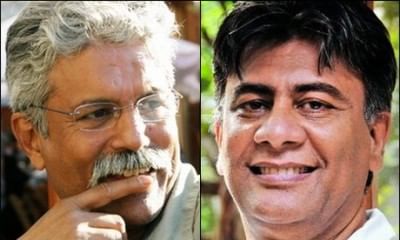In this country, can life survive?

Photo: Star Archive
I used to ask friends, how are you? Now I ask, are you still alive? When saying goodbye, I don't say be well; I say, stay alive. Even if I'm suffering, let me live. Don't let our heroes disappear into the void. A truck full of dead children, brothers beaten to a pulp by the mob, a patient dying because of a missing oxygen cylinder. Please, no more of this.
Our youth should not keep dying from crossfire, or become cripples in the police station. Even with all the insults and anarchy we face, we still want to live.
When someone we loved dearly dies suddenly, it takes a part of our life away. In the last few months, we have received blow after blow. The more death spreads, the more we lose confidence. But beyond the screams of grief at funerals, we can also hear the sounds of protest.
In this country, there is a long curse of sudden death. Are Tareque Masud and Mishuk Munier the first? Filmmaker Alamgir Kabir died a sudden death. Zahir Raihan's body was never found. Humayun Azad could not survive the stabbing. Sudden death came for Monatajuddin. A few days ago, three artists drowned at sea. None of them were able to finish their work. People who were just starting to find a way, but suddenly their path turned into the graveyard. Tareque and Mishuk gave us a lot, but what can be a bigger waste than a sun sinking abruptly in the middle of life. The pain of an unfinished song, the despair of an incomplete dream -- is this now the permanent soundtrack of our national psyche?
When I arrived at the Shaheed Minar to pay my last respects, I saw not only sorrow on the faces of thousands of people, but something else. Is it fury that is pushing aside the stone of grief? If we stayed alone, the despair, fear and anger would eat us alive-- is that why the living came to see each other? Inside that union of grief, an era and a wounded mind was silently shouting.
All deaths are equally tragic. All grief is unbearable. All tears are salty and sharp with pain. It is the death of humanity itself. English poet John Donne said, "any man's death diminishes me, because I am involved in mankind, and therefore never send to know for whom the bell tolls; it tolls for thee."
In the face of Tareque and Mishuk's death, I see the deaths of thousands of other people. On that same day, five people also died in Pabna. Death has united famous and unknown. No one is safe.
Our roads are waiting to dispense the gift of death. Cars are ready to collide, and drivers don't give a damn. There is no one to stop it; no system, no punishment. At the request of the shipping minister, our transportation minister gave 24,000 unfit people driving licenses. Even the horrendous record of past regimes has been eclipsed. Most people behind the wheel are untrained, breaking rules is in their blood. Under the shadow of corruption, managing a license is nothing. Those running the country, running the ministries, they have a license for power. We give them this license through our vote. But when the drivers of cars and the drivers of this country become absolutely senseless, life has to stop. This desert of death cannot be our country.
These accidents are not the writing of fate. In Bangladesh, 12 thousand people die every year in road accidents. That means one person every 45 minutes. It usually takes a war to kill this many people. Bangladesh is now at the top of the list of the world's most dangerous highways. Out of every 10 thousand cars, the accident rate is 87.6. In Myanmar it is 47.7, Nepal 62.7.
This does not happen by natural evolution. Neglect, opportunism, corruption and irresponsible behaviour are everywhere. Almost every single centre of control and supervision has collapsed. Things fall apart, and lives are getting crushed. Instead of calling these deaths accidents, we have to call them structural killing. Tareque Masud, Mishuk Munier, Jamal Hossain, Wasim, Mustafizur Rahman, and every other person dying on our roads is a victim of this structural killing. But up in the palace, no one cares.We too are falling down the slippery slope of self-destruction. We are being recruited to the cause of accidents, of mass beatings. In every moment, we want to overtake each other; we are intolerant, we break rules. We have developed a bizarre ideology: even if everybody else dies, I will survive. We no longer protest; we are only opportunists, and we want to escape.
In this wasteland, nothing can survive. Very few people finish their journey. Any hope for development is smashed into pieces. Anarchy, murder, suicide and despair are finishing us. But we still wait here, hoping, in this graveyard of dreams.
Before the British arrived, anarchy took over Bengal in the seventeenth century. In a novel written in that historical context, Amiya Bhushan Majumdar told us, in this time, men, women, nobody can survive.
Now, in our country, it seems even life cannot survive. In a dark time, waiting for death is to be our new way of living. By expressing grief, we fulfill some haphazard sense of duty. A memorial for death foretold. We realised: "We were alive," but not anymore.
(Abbreviated translation of an essay originally published in Prothom Alo, August 15th, 2011. Translated by Naeem Mohaimen.)
The writer is a journalist.

 For all latest news, follow The Daily Star's Google News channel.
For all latest news, follow The Daily Star's Google News channel. 



Comments